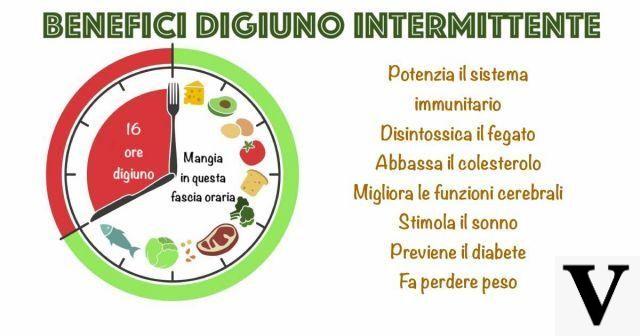
Intermittent fasting - what is it?
Intermittent fasting is a weight loss system based on cardinal principle to create a "window" (time frame) of fasting with a duration that affects the overall caloric balance and hormonal metabolism. In conditions of food abstinence, in addition to a total insulin calm (remember that insulin is the anabolic hormone par excellence but also responsible for adipose deposition), there is a significant increase in another hormone: IGF-1 or somatomedin (some even mention an increase in testosterone). The intermittent deprivation of food is then responsible for the secretion of GH (somatotropin), known as the "feel-good hormone". Unlike insulin, GH, while increasing hypertrophy, does not cause fat deposits, but favors the lipolysis necessary for weight loss and muscle definition.
The main dietary regimes that provide for intermittent fasting are three: the fasting every other day, fasting for 2 days a week and daily fasting (the period of the day during which the individual eats is limited to 8-12 hours and the remaining 12-14-16 hours are fasting).
Dietary pattern of intermittent fasting
The food pattern of intermittent fasting consists of 3 daily meals and 1 training session with a fasting window of 16 hours.
- 1st meal to be consumed as soon as you get up: protein source and carbohydrates with a medium-low glycemic index; low in fat
- 2nd meal - breakfast: complete
- Training (bodybuilding or in any case high intensity training)
- 3rd meal (to be done IMMEDIATELY after training) - lunch: complete
- Fasting window from approximately 13:00 pm or 15:00 pm until the following morning.
Benefits of intermittent fasting
Some specialists propose to treat overweight and metabolic diseases through the so-called therapeutic fast. This practice takes place under conditions of medical supervision and nutritional support. Fasting can be beneficial or harmful based on some factors: duration, completeness of food abstention, pathological conditions for its application, etc. Not all forms of fasting are the same; some are extremely debilitating and unmotivated, others less exhausting and more rational.
Several studies have highlighted the body's health benefits of intermittent fasting. Not only weight loss and the contrast of free radicals, which translated can seem like an elixir of life, but also resources capable of regulating blood sugar levels and inflammation. From a cardiovascular health perspective, intermittent fasting improves blood pressure levels, resting heart rate, blood triglyceride and cholesterol levels, and reduces oxidative stress related to the development of atherosclerosis.
Benefits for athletes and muscle mass
Always in body-building, to increase muscles and decrease fat mass, it is essential to combine diet and training to achieve both goals. Intermittent fasting generates an improvement in body composition in a bilateral way (for increase in muscle mass and for weight loss).
Effects on metabolism
The main essential nutrients for our body are the sugar (in particular the glucose) he fatty acids. After meals, excess fats are accumulated in the form of adipose tissue triglycerides which during fasting are broken down into glycerol and fatty acids. The liver transforms fatty acids into chetonic bodies, which provide energy to many organs (during fasting: the levels of ketone bodies increase in the blood of humans approximately 8-12 hours after consuming the last meal). The change in metabolism affects the regulation of glucose levels, blood pressure, heart rate and abdominal fat loss.
Effects on health and aging
Caloric restriction (i.e. the reduction of food intake) seems to be able to increase life expectancy. In some studies, people subjected to intermittent fasting have shown: weight loss, reduction in abdominal circumference, better insulin sensitivity and therefore a lower risk of developing diabetes, greater muscle endurance and increased cognitive ability. However, there is a lack of scientific validation capable of defining whether these effects are related to intermittent fasting or to the caloric deficit alone.
The Okinawa case
L'Okinawa island (south of Japan) holds the absolute record for the number of ultra-centennial inhabitants in top form. Here intermittent fasting is practiced regularly, mainly vegetables, seaweed, goya, tofu, fish (very raw, even large pieces such as tuna) and very little meat are eaten. Another very important aspect that characterizes the food style of the inhabitants of this Japanese island is the calorie moderation; in this regard, a famous local saying suggests eating about 80% of the food needed to feel full.
Long-term applicability
Despite the disparate health benefits of intermittent fasting, incorporating this practice into everyday life is not easy: during the first few weeks, most people have to deal with anger, irritability, and difficulty concentrating. Before starting intermittent fasting is necessary ask for the help of a nutritionist o dietician to ensure a balanced intake of macro and micro nutrients.


























